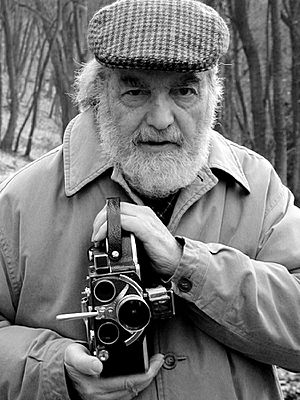Osvaldo Bayer facts for kids
Osvaldo Bayer (born February 18, 1927 – died December 24, 2018) was an important writer and journalist from Argentina. He lived in Buenos Aires. In 1974, during the time Isabel Perón was president, he had to leave Argentina. He lived in Linz am Rhein, Germany, during a difficult period in Argentina called the National Reorganization Process (1976–1983).
Contents
Osvaldo Bayer's Life Story
Osvaldo Bayer described himself as an "ultra-pacifist anarchist". This means he believed in peace and freedom for everyone. He was born in Santa Fe and grew up in Bernal and Belgrano, which are areas in Argentina. His parents lived in Rio Gallegos, a town in Patagonia. This experience later inspired his famous book, Rebellion in Patagonia. This book tells the true story of a terrible event where many striking farm workers were killed.
Early Life and Education
Before becoming a writer, Osvaldo worked for an insurance company. He also worked on a ship as an apprentice helmsman, which is someone who steers a boat. From 1952 to 1956, he studied history at the University of Hamburg in Germany. While there, he joined a group called the Socialist Students’ League.
After returning to Argentina, he focused on journalism and studying history of Argentina. He also wrote scripts for movies. He briefly studied medicine and then philosophy in Buenos Aires. He became interested in anarchist ideas, which he had learned about during his time in Germany. He also helped start the Human Rights Department at the University of Buenos Aires.
Journalism and Activism
Osvaldo Bayer worked for several newspapers, including Noticias Gráficas, Clarín, and Esquel. In 1958, he started his own newspaper called La Chispa ("The Spark"). This was the first independent newspaper in the Patagonia region.
In 1959, he was accused of sharing secret information by the military government. The National Gendarmerie forced him to leave Esquel. After this, from 1959 to 1962, Bayer became the general secretary of the Press Syndicate. He then worked for the national newspaper Diario Clarín as the Chief of the Politics section.
Challenges and Exile
During Isabel Perón's government, Osvaldo Bayer received many threats because of his work. His book Rebellion in Patagonia was especially controversial. It talked about the massacre of striking farm workers in Patagonia in the 1920s.
In 1974, a movie based on Rebellion in Patagonia was made by Héctor Olivera. The movie won an award at the Berlin International Film Festival. However, it was banned in Argentina, and people involved in the film were threatened. Because of these threats, Osvaldo Bayer was forced to leave Argentina in 1975. He went to West Germany as the Dirty War was starting in his home country.
He tried to organize a special trip back to Argentina in 1981 with other famous writers. The idea was to protest the dictatorship. However, the plan did not work out. Osvaldo Bayer finally returned to Argentina in 1983 after Raúl Alfonsín was elected president and democracy returned. In 1984, he wrote a book about exile with the poet Juan Gelman.
Some of Bayer's books were banned in Argentina. His book about the Italian anarchist Severino Di Giovanni was banned by President Raúl Alberto Lastiri in 1973. La Patagonia Rebelde was banned by Isabel Perón. Other books were even burned by the military after they took power in 1976.
Osvaldo Bayer passed away on December 24, 2018, in Buenos Aires. He was 91 years old.
After Democracy Returned
On April 20, 2003, Osvaldo Bayer received an Honorary Doctor title from the Universidad Nacional del Centro de la Provincia de Buenos Aires. This was to honor his important work in human rights, literature, and journalism.
Bayer also worked to support the rights of Indigenous people. He was named an "Illustrious Citizen of Buenos Aires" by the mayor. However, shortly after, the Senate declared him persona non grata. This happened because he suggested uniting the Argentinian and Chilean parts of Patagonia. He saw this as a first step for a common market in Latin America.
In 2008, he wrote for the newspaper Página 12. He also wrote the screenplay for the film La Patagonia Rebelde, which was based on his book. This film won the Silver Bear Award in 1974. He also wrote the script for the 1988 film La Amiga, which was a drama about the dictatorship.
Filmography
- Asylum, a short documentary from 1984. Osvaldo Bayer helped write the script. The film won an award at the Internationale Kurzfilmtage Oberhausen.
- Los cuentos del timonel by Eduardo Montes-Bradley, a film from 2001 that features Osvaldo Bayer in Germany.
See also
 In Spanish: Osvaldo Bayer para niños
In Spanish: Osvaldo Bayer para niños
 | Frances Mary Albrier |
 | Whitney Young |
 | Muhammad Ali |


